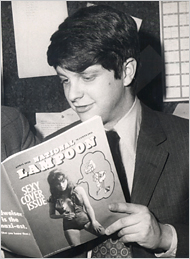 I read in the paper today that the founding editor of the National Lampoon, one of my favorite magazines from way back when, has just passed away. In his New York Times obituary, we learn that after he made his money in publishing, he became a collector of fine art. In fact, he called art “the only effective method to travel and connect across time and space.”
I read in the paper today that the founding editor of the National Lampoon, one of my favorite magazines from way back when, has just passed away. In his New York Times obituary, we learn that after he made his money in publishing, he became a collector of fine art. In fact, he called art “the only effective method to travel and connect across time and space.”
What an interesting concept! But isn’t it true? Don’t we connect to Mozart’s age by hearing one of his symphonies? Don’t we get a sense of the confusion and disarray of early 20th Century Europe by hearing a Schoenberg string quartet? And what about negro spirituals? How about the jazz age music of Cole Porter?
And I wonder: How is the music we compose today reflective of our “time and space”? Is classical music adequate? Or must we look to popular music as being more representative?
In 100 years, what music will be listened to to reflect the “time and space” of the early 2000s?
Leave a Reply